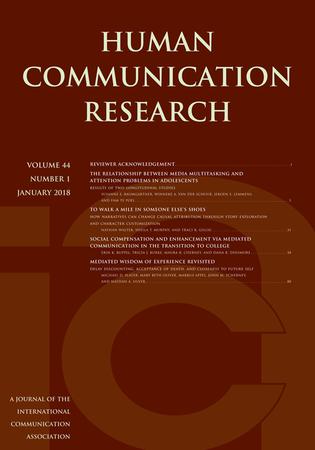安慰性对话中寻求支持和提供支持行为的相互影响:一个转折层次分析
IF 4.4
1区 文学
Q1 COMMUNICATION
引用次数: 5
摘要
相互影响是突出的支持性传播理论的核心,但研究仍然不足。我们进行了一项转向水平分析,以调查334对陌生人讨论个人问题时对话展开性质的相互影响。我们研究了寻求支持者产生的信息类型如何影响提供者的即时响应,以及提供者的响应如何影响寻求支持者发出的下一条信息。寻求者使用方法的行为和开脱理由与提供者反应中较高水平的以人为中心有关,回避行为与较低水平的以提供者为中心有关。以提供者为中心的程度越高,接近行为、无罪辩护和入罪辩护的可能性越大,寻求者回避行为的可能性越低。研究结果共同表明,寻求者和提供者在支持性对话中产生的信息存在良性和恶性循环。本文章由计算机程序翻译,如有差异,请以英文原文为准。
Mutual influence in support seeking and provision behaviors during comforting conversations: a turn-level analysis
Mutual influence is central to prominent supportive communication theories but remains understudied. We conduct a turn-level analysis to investigate mutual influence in the unfolding nature of conversations among 334 stranger dyads discussing a personal problem. We examine how the types of messages produced by support seekers influence the immediate response from providers, and how that provider response impacts the next message produced by support seekers. Seeker use of approach behaviors and exonerating justifications were associated with higher levels of person centeredness in provider responses, and avoidance behaviors were associated with lower levels of provider person centeredness. Higher levels of provider person centeredness were associated with a greater likelihood of approach behaviors, exonerating justifications, and incriminating justifications and lower likelihood of avoidance behaviors from seekers. The results collectively suggest virtuous and vicious cycles in the messages produced by seekers and providers during supportive conversations.
求助全文
通过发布文献求助,成功后即可免费获取论文全文。
去求助
来源期刊

Human Communication Research
COMMUNICATION-
CiteScore
8.20
自引率
2.00%
发文量
28
期刊介绍:
Human Communication Research is one of the official journals of the prestigious International Communication Association and concentrates on presenting the best empirical work in the area of human communication. It is a top-ranked communication studies journal and one of the top ten journals in the field of human communication. Major topic areas for the journal include language and social interaction, nonverbal communication, interpersonal communication, organizational communication and new technologies, mass communication, health communication, intercultural communication, and developmental issues in communication.
 求助内容:
求助内容: 应助结果提醒方式:
应助结果提醒方式:


